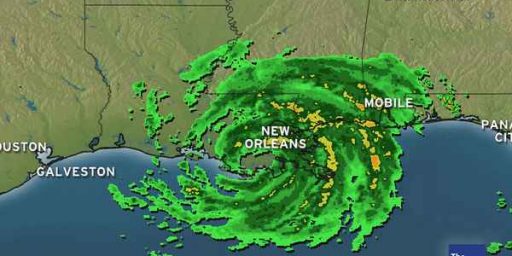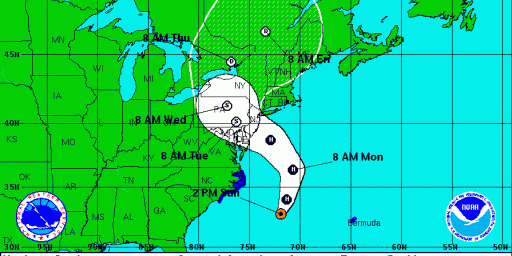Katrina: Budget Cuts to Blame for Flooding?
Several officials in New Orleans and other areas devasted by Hurricane Katrina have been asking why more was not done to protect against massive storms and why the federal response was not faster and heavier. Many are blaming budget cuts and the spending priorities of the Bush Administration, especially the war in Iraq.
A Reuters story lends some credence to these charges: Budget cuts delayed New Orleans flood control work
Bush administration funding cuts forced federal engineers to delay improvements on the levees, floodgates and pumping stations that failed to protect New Orleans from Hurricane Katrina’s floodwaters, agency documents showed on Thursday. The former head of the U.S. Army Corps of Engineers, the agency that handles the infrastructure of the nation’s waterways, said the damage in New Orleans probably would have been much less extensive had flood-control efforts been fully funded over the years. “Levees would have been higher, levees would have been bigger, there would have been other pumps put in,” said Mike Parker, a former Mississippi congressman who headed the engineering agency from 2001 to 2002. “I’m not saying it would have been totally alleviated but it would have been less than the damage that we have got now.”
Eighty percent of New Orleans was under water after Katrina blew through with much of the flooding coming after two levees broke. A May 2005 Corps memo said that funding levels for fiscal years 2005 and 2006 would not be enough to pay for new construction on the levees. Agency officials said on Thursday in a conference call that delayed work was not related to the breakdown in the levee system and Parker told Reuters the funding problems could not be blamed on the Bush administration alone.
Parker said a project dating to 1965 remains unfinished and that any recent projects would not have been in place by the time the hurricane struck even if they had been fully funded. “If we do stuff now it’s not going to have an effect tomorrow,” Parker said. “These projects are huge, they’re expensive and they’re not sexy.” White House spokesman Scott McClellan said the administration had funded flood control efforts adequately.
Tensions over funding for the New Orleans levees emerged more than a year ago when a local official asserted money had been diverted to pay for the Iraq war. In early 2002, Parker told the U.S. Congress that the war on terrorism required spending cuts elsewhere in government.
The Corps of Engineers denies this, however, and the evidence makes clear that the budget priorities changed long before the Iraq War or the current administration.
Corps officials: Funding levels not to blame for flooding (Chicago Tribune)
The U.S. Army Corps of Engineers said Thursday that a lack of funding for hurricane-protection projects around New Orleans did not contribute to the disastrous flooding that followed Hurricane Katrina. In a telephone interview with reporters, corps officials said that although portions of the flood-protection levees remain incomplete, the levees near Lake Pontchartrain that gave way–inundating much of the city–were completed and in good condition before the hurricane.
However, they noted that the levees were designed for a Category 3 hurricane and couldn’t handle the ferocious winds and raging waters from Hurricane Katrina, which was a Category 4 storm when it hit the coastline. The decision to build levees for a Category 3 hurricane was made decades ago based on a cost-benefit analysis. “I don’t see that the level of funding was really a contributing factor in this case,” said Lt. Gen. Carl Strock, chief of engineers for the corps. “Had this project been fully complete, it is my opinion that based on the intensity of this storm that the flooding of the business district and the French Quarter would have still taken place.”
Strock also denied that escalating costs from the war in Iraq contributed to reductions in funding for hurricane projects in Louisiana, as some critics have suggested. Records show that corps funding for the Louisiana projects has generally decreased in recent years.
[…]
A project to build up the levees to withstand a Category 3 hurricane was launched in 1965 after Hurricane Betsy and was supposed to be completed in 10 years, but it remains incomplete because of a lack of funding.
In recent years, funding has dropped precipitously, which some officials attributed in part to the escalating costs of the Iraq war. Funding for a drainage project in New Orleans went from $69 million in 2001 to $36.5 million in the current fiscal year, while funding for such hurricane-protection projects as levees around Lake Pontchartrain declined from $10 million in 2001 to $5.7 million this year, according to figures provided by the office of Sen. Mary Landrieu (D-La.).
Funding for these projects has generally trended downward since at least the last years of the Clinton administration. Congressional records show that the levee work on Lake Pontchartrain received $23 million in 1998 and $16 million in 1999. It was not clear how much the drainage project received in 1998, but records show it received $75 million in 1999. Neither the White House nor the Corps of Engineers would confirm the numbers, nor would they provide funding levels dating to previous administrations.
Parker is of course right that decisions on infrastructure spending have an impact years, sometimes decades, down the road. Almost by definition, the fact that the Gulf Coast was devastated by this storm demonstrates that we did not spend enough money to prevent it. How much more we could have spent–or whether current technology would have been adequate at any price–is well beyond my expertise, however.
There’s plenty of “blame” to go around here, if it’s warranted. Certainly, no president in my memory has launched a crusade to spend tens of billions more on levees and other storm protection measures. Nor, despite their willingness to spend exhorbitant amount of money on various “pork barrel” projects in their states and districts, has Congress allocated these monies. Again, Parker is right: That sort of spending isn’t very “sexy.” Whether it’s smart, in the grand scheme of federal priorities, is again well beyond my expertise.
Update: AP political writer Ron Fournier agrees.
Newsview: Politicians Failed Storm Victims
There’s plenty of blame to go around — the White House, Congress, federal agencies, local governments, police and even residents of the Gulf Coast who refused orders to evacuate. But all the finger-pointing misses the point: Politicians and the people they lead too often ignore danger signs until a crisis hits.
It wasn’t a secret that levees built to keep New Orleans from flooding could not withstand a major hurricane, but government leaders never found the money to fully shore up the network of earthen, steel and concrete barriers. Both the Bush and Clinton administrations proposed budgets that low-balled the needs. Local politicians grabbed whatever money they could and declared victory. And the public didn’t exactly demand tax increases to pay for flood-control and hurricane-protection projects.
Just last year, the Army Corps of Engineers sought $105 million for hurricane and flood programs in New Orleans. The White House slashed the request to about $40 million. Congress finally approved $42.2 million, less than half of the agency’s request.
Yet the lawmakers and Bush agreed to a $286.4 billion pork-laden highway bill that included more than 6,000 pet projects for lawmakers. Congress spent money on dust control for Arkansas roads, a warehouse on the Erie Canal and a $231 million bridge to a small, uninhabited Alaskan island.How could Washington spend $231 million on a bridge to nowhere — and not find $42 million for hurricane and flood projects in New Orleans? It’s a matter of power and politics.
Sadly, true.





Although, for the record, the dust control project was for roads in Arizona, not Arkansas.
Many journalists still don’t know the difference between AR and AZ!
And, once again, the “big hit” levee failure at 17th Street was at a complete, and freshly renovated section. The other failure was also at a place where there were no plans for further additions or changes.
In other words, the current budget made zero difference to the disaster, except in the sense that Louisiana, New Orleans, and Washington didn’t spend the billions it would have taken to expand and increase the levee system for that once in a hundred years storm.
True. The budget cuts probably did. But, let us not absolve the victims of Katrina, particularly the white victims in MS, AL and LA. These whites voted for this clown and will vote for this clown again, the moment Karl Rove pulls the race card and employs the southern strategy. As you sow so shall you reap!